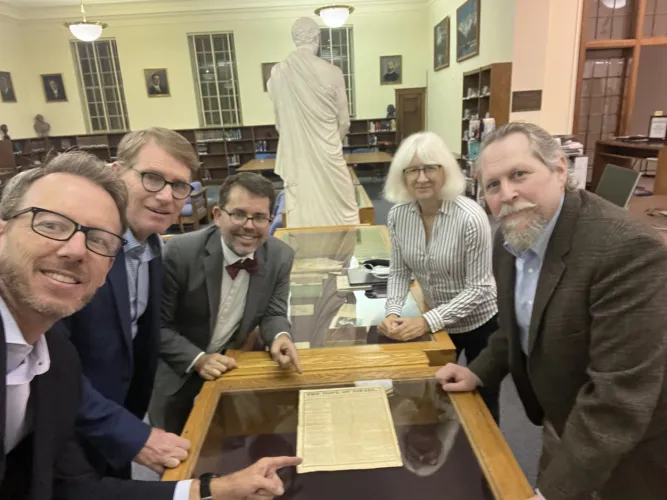Periodical published in July 1844 by the Millerites is revealing, church historians say.

A newly discovered 179-year-old document is shedding light on the early days of the Seventh-day Adventist Church before the denomination existed as such. The document, which was discovered by Southern Adventist University alumnus Michael Campbell, is the very first issue of The Hope of Israel, a Millerite periodical printed on July 19, 1844, and edited by Joseph Turner and John Pearson Jr.
Millerites were followers of the well-known Baptist preacher William Miller, and they believed Jesus would return to earth in 1844. The Millerite movement ignited the eventual formation of the Seventh-day Adventist Church.
Campbell, who is the director of Archives, Statistics and Research for the North American Division of the Seventh-day Adventist Church, discovered the document during the Women in Adventist History convention that took place in October at Washington Adventist University in Takoma Park, Maryland, while he was looking through the university’s heritage collection.
In an email communication, Campbell wrote that the discovery of this document is significant for several reasons. First of all, it provides a more specific date for the launch of The Hope of Israel, which until now had only been estimated.
“This is a crucial document for Adventist historians,” Campbell wrote. “Until now, we could only guess as to when The Hope of Israel began. Now we know it specifically began in the summer of 1844 at a crucial time with a group of Millerites, in whose circles James and Ellen White were very active.”
Second, the document describes an early Millerite conference held at Megquier Hill in West Poland, Maine. The conference was held less than a year before Ellen Harmon would publicly share her first vision for the first time at another conference in the same location.
Harmon, who later became Ellen White, was a co-founder of the Adventist Church, which teaches that the spiritual gift of prophecy was manifested in her ministry. She experienced her first vision during a prayer meeting at a neighbor’s home in Portland, Maine. According to her account, Ellen White was shown a series of panoramic scenes depicting the history of salvation, from the creation of the world to the second coming of Christ and the establishment of the New Jerusalem. The vision also emphasized the importance of the Advent belief in a soon-coming judgment and the need for personal preparation.
This document also gives insight into life before the Great Disappointment of 1844, named for the Millerites’ reaction when Jesus did not return to earth as they expected. That event that would later inspire the founding of the Adventist Church. On an episode of Campbell’s “Adventist Heritage” podcast, he said, “They’re waiting for Christ to come on October 22, 1844, hence the name ‘The Hope of Israel.’ They’re looking for Jesus to come as that metaphorical hope.”
In addition, the newly discovered document also contains content tied to historically significant happenings. For example, the back page of the periodical features an article highlighting abolitionism, which was a controversial issue at the time.
“At the last page there is what’s called ‘Astounding Statistics,’ and it’s talking about missions and missionary work.… You [also] have all these people that have been enslaved and that the slave population is increasing at a rate of 75,000 per year,” Campbell said in the podcast episode. “So, you look at how many people are being converted through missionary work, and then they’re not keeping up with the rate of the population expansion of slavery and people taken away from access to the gospel.”
The original version of this story was posted by the Southern Accent.









